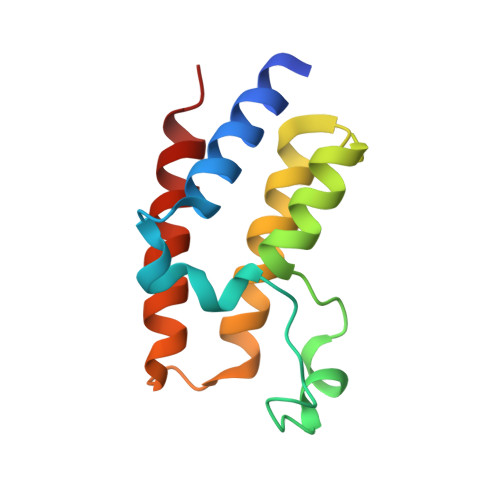Physachenolide C is a Potent, Selective BET Inhibitor.
Zerio, C.J., Sivinski, J., Wijeratne, E.M.K., Xu, Y.M., Ngo, D.T., Ambrose, A.J., Villa-Celis, L., Ghadirian, N., Clarkson, M.W., Zhang, D.D., Horton, N.C., Gunatilaka, A.A.L., Fromme, R., Chapman, E.(2023) J Med Chem 66: 913-933
- PubMed: 36577036
- DOI: https://doi.org/10.1021/acs.jmedchem.2c01770
- Primary Citation of Related Structures:
7R8R, 7S3P - PubMed Abstract:
A pulldown using a biotinylated natural product of interest in the 17β-hydroxywithanolide (17-BHW) class, physachenolide C (PCC), identified the bromodomain and extra-terminal domain (BET) family of proteins (BRD2, BRD3, and BRD4), readers of acetyl-lysine modifications and regulators of gene transcription, as potential cellular targets. BROMOscan bromodomain profiling and biochemical assays support PCC as a BET inhibitor with increased selectivity for bromodomain (BD)-1 of BRD3 and BRD4, and X-ray crystallography and NMR studies uncovered specific contacts that underlie the potency and selectivity of PCC toward BRD3-BD1 over BRD3-BD2. PCC also displays characteristics of a molecular glue, facilitating proteasome-mediated degradation of BRD3 and BRD4. Finally, PCC is more potent than other withanolide analogues and gold-standard pan-BET inhibitor (+)-JQ1 in cytotoxicity assays across five prostate cancer (PC) cell lines regardless of androgen receptor (AR)-signaling status.
Organizational Affiliation:
College of Pharmacy, Department of Pharmacology and Toxicology, University of Arizona, 1703 E. Mabel Street, PO Box 210207, Tucson, Arizona 85721, United States.
















